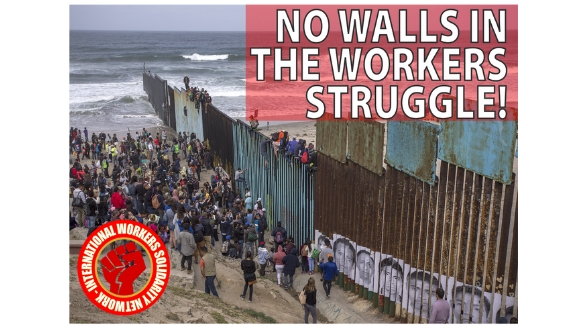



Workers World Party celebrates the indomitable fighting spirit of masses of workers and oppressed peoples who are marching on May 1, International Workers’ Day.
May Day — born in the class struggle for justice — continues today in the global rising of millions against exploitation imposed by transnational capitalism.
This day of workers began in the United States on May 1, 1886, when a nationwide strike, initially called by the Federation of Organized Trades and Labor Unions (later the American Federation of Labor) demanded an 8-hour working day. As Martha Grevatt, WW editor and longtime autoworker, wrote in a March 23, 2012, article:
“About a quarter of a million took part in many cities, but Chicago, with its militant, left-wing labor movement, had the largest demonstration. There, tens of thousands laid down their tools, and women and men poured into the streets. The demonstrations continued past May 1, and on May 3 police attacked and six workers were killed.
“The next day a protest over the killings was held in Haymarket Square. A bomb was thrown, a policeman was killed, and a struggle broke out that left seven police and four workers dead. Eight workers’ leaders were convicted of murder, five of them sentenced to death. Four were hanged [in 1887] and one reportedly committed suicide.”
The deaths of those who became known as the Haymarket Martyrs inspired the Socialist (or Second) International to designate May 1 as International Workers’ Day in 1889, creating an international day of fiery militancy and solidarity.
After Haymarket, the U.S. state apparatus launched widespread reprisals against immigrants, as well as against organizers perceived to be “reds” — anarchists, socialists or communists.
But these im/migrant-radical connections were not imaginary. Of Haymarket’s eight leaders convicted of murder, seven were immigrants — six from Germany and one from England. They brought highly developed labor organizing skills — both tactics and theory — with them when they came to the U.S.
The eighth leader, Chicago Typographical Union Secretary Albert Parsons, was Alabama born. A former Confederate soldier, he pursued a path that present-day white workers should emulate. He turned his back on white-supremacist former slave owners and embraced multinational, anti-racist worker solidarity.
His spouse, who moved with him from Texas to Chicago where they became organizers, was Lucy Gonzalez Parsons, an African, Indigenous and Mexican woman who devoted her life to fighting poverty, racism, sexism and capitalism.
Lessons of the first May Day
The lessons from that first May Day remain relevant today — the imperative need for global worker interconnection and multinational solidarity.
In the U.S., we are again seeing attacks on im/migrant workers and on union organizing. The federal government has set up concentration camps for migrants, including their children. Federal agencies and state legislatures have found new ways to incapacitate unions.
The mobility and power of multinational capitalism have grown exponentially, increasing the offshoring and outsourcing of jobs and pitting workers in different countries — and within the same country — against each other.
But, with globalization, the power of the international, multinational working class is growing. The number of workers worldwide has more than doubled between 1990 and 2016, from 1.5 billion to 3.2 billion. The number of women in the global labor force has grown across all income levels. Meanwhile, more than 2 billion people work in the informal or “precarious” sector, with no legislative or union safety net.
Globalization means increased communication within this massive class bloc. We saw this last November when 20,000 Google tech workers poured out of 40 offices around the world in a rolling strike. They made history by building solidarity among full-time workers, temporary workers, vendors and contractors, and by pressing for an end to sexist and racist practices by their transnational boss.
In the U.S., May Day emerged once more in 2005, in a protest called by class-conscious Black labor unionists in the Million Worker March Movement. They emphasized the need for workers to fight in their own name, independent of big-business political parties.
Then in 2006, migrant workers, led by Latinx organizers, used May Day as a rallying point against racist anti-immigrant legislation. This general strike shut down parts of the U.S., bringing May Day back with a roar.
The tide of class struggle continues to rise. Massive education worker strikes began in 2017 in West Virginia and continue, from kindergartens to colleges. Up against global austerity, education workers are not only defending themselves as workers, but are advancing the right of children of color, migrant children, children with disabilities and rural children to have access to quality public education.
More U.S. workers, from teachers to hotel workers to fast food workers, took part in strikes and other work stoppages in 2018 than in all the previous 30 years. These actions were most often led by women and other gender-oppressed people, im/migrants and people of color.
‘May Day every month!’
As the global ruling class attempts to divide and conquer the global working class with racism and bigotry, let us rally together in a “May Day every month!”
Workers World Party is endorsing a global campaign for monthly Worker Solidarity Days, militant actions that boldly assert: “No Walls in the Workers’ Struggle!”
Every community and every workplace has some point of struggle. Now is the time for solidarity. The struggle is rising!
Ultimately, May Day should be every day!
For more information on Worker Solidarity Days, visit workersolidarity.net.
This statement was recently issued by over 30 groups. On Friday, March 28, Dr. Helyeh…
When Donald Trump announced massive tariffs on foreign imports April 2, Wall Street investors saw…
The century-long struggle to abolish the death penalty in the U.S. has been making significant…
Download the PDF May Day appeal to the working class Revolutionary change is urgent! Gaza…
Philadelphia On March 26, the Pennsylvania Supreme Court denied political prisoner Mumia Abu-Jamal permission to…
There are two important and overlapping holidays on April 22: Earth Day and Vladimir Lenin’s…